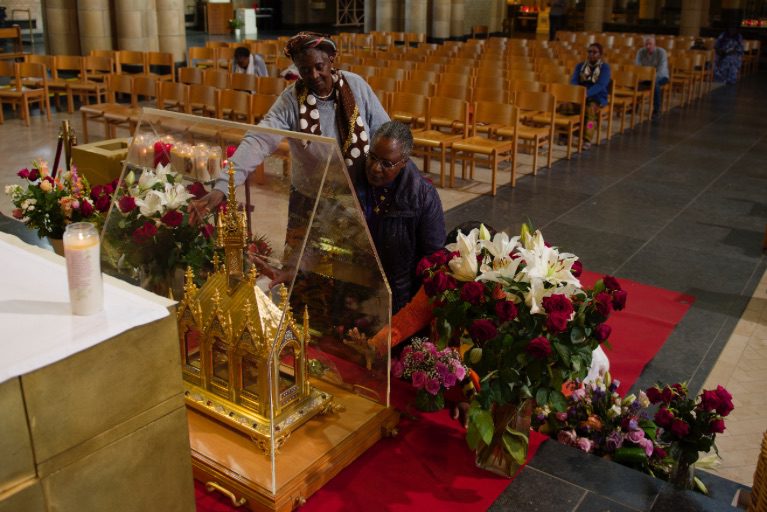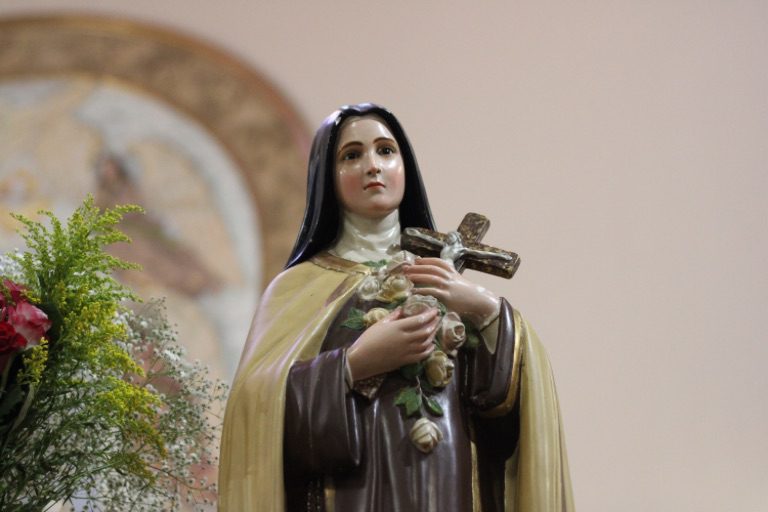As I approach a very special birthday, I decided to revisit some of the books that helped me better understand God’s love. Besides the Bible, the first book on my list is The Story of a Soul by Saint Theresa of Lisieux.
There are other books: The Dialogue of Saint Catherine of Siena and True Devotion to Mary by Louis-Marie de Montfort. Others include Peace of Soul and Life of Christ by Fulton J. Sheen, The Interior Castle and The Way of Perfection by Saint Teresa of Avila. Also included are Dark Night of the Soul by Saint John of the Cross, Treatise on the Love of God by Francis de Sales, and The Spiritual Exercises of St. Ignatius of Loyola. Although I didn’t have a book about Padre Pio then, I read some writings about him that made him special to me, too. I will revisit his biography, which I found years later.
These books (and the stories of the saints) I read before I was 18 have been pivotal to me as I grew up. They shaped my perspective on life in ways I can’t estimate. I will reread them to celebrate these months of a significant milestone in my spiritual journey. Today, I want to share a tip of what I learned from The Story of a Soul, which I read again this week.
The Story of a Soul
At the age of 14, no saint’s words resonated with me more than those of Saint Theresa of Lisieux in The Story of a Soul. I remember finding a quiet corner in our family home, immersing myself in the gentle nun’s words. I recall feeling a strange but profound connection with her as I learned about her pen pal, a missionary priest in Africa named Maurice. This coincidence seemed to spiritually bind us.
Was it why my beloved mom Grace and dad Alphaeus (all late) named me Maurice? I doubt it because mom (who suggested the name) didn’t know I would grow to love Saint Theresa of Lisieux. Unless there is a big secret mom has, I would love to know those from great moms who pour their love for their children daily.

When I picked up The Story of the Soul to read again, I wondered if it would still mean as much to me now, over 30 years later. It sure did!
Saint Theresa of Lisieux’s religious name is Saint Theresa of the Child Jesus. She is fondly known as The Little Flower. She wrote words that still touch my heart. Every line is like a spiritual drop of heavenly anointing, dotted with the ornaments of real human struggles yet beautiful with hope, love, and affectionate devotion. With deeper abstraction now, I can relate more intensely than I could when I was fourteen.
Like a Child
In Scripture, the Blessed Lord talks about us being like a child as the certainty for greatness (Matthew 18:1-4). It’s like being a little flower, which reminds me of how The Little Flower thought about life. Jesus said, “Whoever humbles himself like this child is the greatest in the kingdom of heaven.”
Saint Theresa believed that every flower, big or small, is God’s delight. It’s not about doing big things but about being in God’s love and doing anything—big or small—with much of that love.
Love blooms and soars to heights no one could fathom. For love, we live beyond ourselves and in the advancement of others. For love, we can make sacrifices, endure pains, and feel confident in the gentle gaze of the Holy Face who touches us from the cross with the balm of grace and strength to do even more. We feel no loss for love is like lossless data; the more it is poured, the richer it becomes. Love’s depth is lavish outpouring.
Being Behind the Scenes
Saint Theresa helped me see life differently. I like to stay behind the scenes. It isn’t because I’m scared or ill-equipped to stand out, but because I believe the most critical things happen quietly. I might be wrong. Nevertheless, the credible life of this saint makes me hold on to this lifestyle and feel okay even when my ego suggests I do otherwise. Even though I’ve had to be in public domains more than I’d like, I still love being close to my spiritual core and helping others quietly. I say I love it, but actually, I don’t. But I kind of see myself choosing that route anyway.

Could it be that God is helping me despite knowing I would instead do the opposite? I don’t know; never sure of the answer. Whatever the case, I get a kick out of the “holy comedy”—the divine irony of feeling God’s gentle push draw me in to do what I would rather not have loved to do. This realization makes me understand that our lives are not actually our own, no matter how rebellious we often desire to be. Who says love is sweet? Then, they don’t realize the true price of love.
The Vocation to Love
Reading about The Little Flower again made me realize how much she inspired me and molded my attitude to life. I wish I could ask her how she would’ve lived in today’s world. How would she use technology? Now that I teach communication and tech at the university, I’d love to ask her how she’d do so. How would she show love in little ways as a teacher or leader? How would she live holy in a messy world, unlike the convent where she lived all her short adult life, walled off from the messiness of the world? How would she travel across states giving speeches, retreats, writing, and delivering sermons while remaining humble? How would she care for students and parishioners? I can only wonder.
Her message about love still resonates deeply with me, even though we live in different times. The enduring presence of God’s grace is a testament to the timeless relevance of her teachings, and what mattered to her still holds significance for me.
Reading her words made me tear up again and again, as I did as a teen. How is that possible? I thought I had grown past some of my spiritual tenderness, but I haven’t, and I don’t think I can. How would the words of a straightforward child in the remote part of the Normandy region in France who does not share the same cultural upbringing, have such a moving impact on me? God works across borders. With God, there are no boundaries to the movement of his grace and Spirit.
A Prayer for Love
Dear Little Flower, my spiritual mentor, I am grateful for your presence in my life. As I embark on this next phase of my journey, I seek only one thing—love. Love for God with all my heart and love for others, a love that flows from deep union with God, my Love. Amen.
[Readings for Memorial of Saint Theresa of Lisieux: Isaiah 66:10-14c; Matthew 18:1-4. Readings for the Mass of the Day: Jb 3:1-3, 11-17, 20-23; Lk 9:51-56]

Thank you, Father Maurice, for this personal reflection on the Little Flower, such a dear saint to so many of us! I also have been re-reading Story of a Soul these past couple weeks. You mention the divine irony of being nudged toward acts of love we might rather not do. I have been struck on this reading by how joyfully Therese did this–how she loved to do things that might otherwise have been disagreeable to her. Certainly a lesson for me. Thank you and God bless! And also, how providential that the name of her pen pal priest was Maurice.
Thanks, Radhika, for kind words. The Little Flower’s impact in my life and many people’s can’t be estimated. God continues to reveal himself through his people.